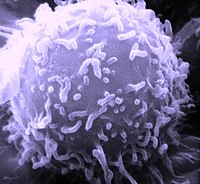
Photo from wikipedia
How an antigen interacts differently with lymphocytes and other cells of the immune system, to result in the generation of distinct classes of immunity, is one of the most basic… Click to show full abstract
How an antigen interacts differently with lymphocytes and other cells of the immune system, to result in the generation of distinct classes of immunity, is one of the most basic questions of immune regulation. Understanding the nature of these “decision criteria” is central to developing effective medical interventions. Clinical observations lead to the recognition that much disease is due to an inappropriate class of immunity being generated, inappropriate because damaging, as in autoimmunity and allergies, or inappropriate because ineffective, against pathogens and cancer. I argue that the prevalent, contemporary conceptual frameworks, employed to analyze the nature of the decision criterion controlling the Th1/Th2 phenotype of the immune response, are implausible, as they ignore pertinent, classical observations. I outline reasons for favoring a different framework, that takes these observations into account, and explore its pertinence to the design of strategies of medical intervention.
Journal Title: Frontiers in Immunology
Year Published: 2019
Link to full text (if available)
Share on Social Media: Sign Up to like & get
recommendations!